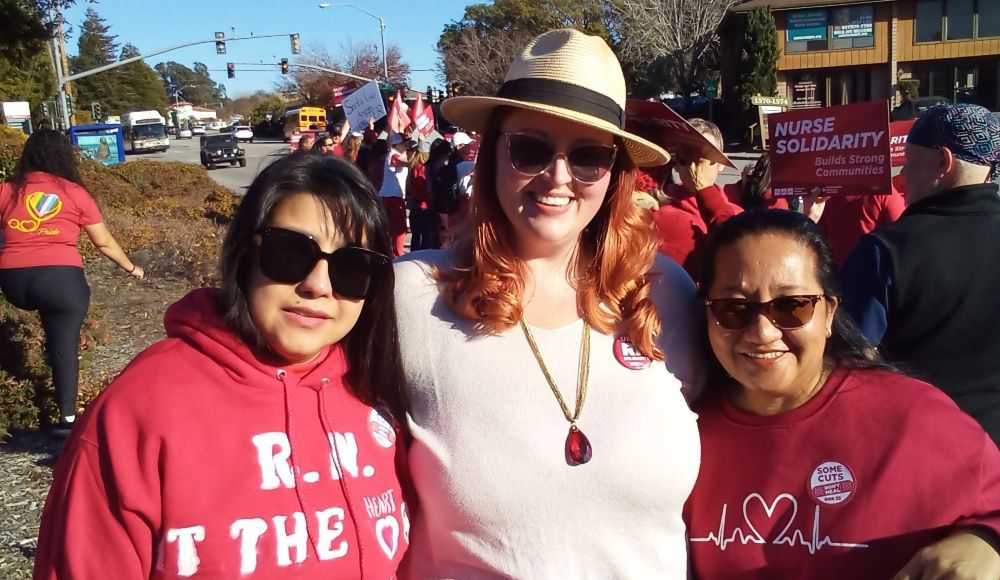“They say cut back. We say fight back!” was the rallying cry on Thursday as registered nurses lined Soquel Avenue in front of Dominican Hospital for a National Day of Solidarity, organized by the Nurse Advocacy Network. It marked the first time the Dominican staff has participated in what has become a yearly, national event.
Many passing motorists honked their horns in support of the appreciative nurses, who waved signs, clattered noisemakers and chanted loudly, though at a distance from the hospital.
“We want to make sure that our community knows that we’re here for them and we’re fighting for them. That’s what this Day of Solidarity is for,” said Annalisa Andersen, a union spokesperson.
“What we’re mainly here for is safe staffing,” she said, describing what she says is an ongoing issue that healthcare workers are facing nationwide. “We’re constantly told that we’re fully staffed even though we’re finding that we’re short on every shift.”
Andersen explained that staffing guidelines are passed down from the top administrators of Dominican’s health care system, but nurses who work night and day with their patients say they don’t reflect the reality of what is needed.
“Sometimes we’re having to work a skeleton crew with only one patient care technician,” Andersen said. PCTs help with taking vitals, assisting with the commode, changing bedding, turning patients, and cleaning and restocking the floor.
“When we don’t have that staff we need to fill in for them, taking away time for us to give the kind of care that patients really want, and cuts back on our ability to take much-needed scheduled breaks.”
The problem is not a nursing shortage; in fact, there is a surplus of people who are qualified to nurse, according to Andersen.
“The problem,” she says, “is getting people to hire them, getting them educated and then keeping them on staff. That’s why we want more incentives to keep people where they are.”
High on the list of issues in upcoming union negotiations will be shift-specific incentives, called differentials, which Andersen says are essential to retain staff for difficult positions.
For example, Andersen cites the NOC shift—“noc” for nocturnal, from 11pm to 7am—to which newcomers are often assigned.
“It’s hard to keep people on that shift,” she said. “The NOC is proven to be bad for your health. It can cause heart problems, and sleep deprivation can cause cancer. An incentive would keep people—experienced people—on that shift,” she said.
Artificial intelligence related to hospital care is also a pressing concern voiced at the demonstration.
“We want to use AI in nursing, and slowly introducing AI is something that we’re expecting,” Andersen said. “But, we’re fighting to ensure that we’re introducing it in a safe way and not overshadowing the human experience. To be safe, we want to make sure we’re not cutting corners.”
The official statement received from Dignity Health reads, “We recognize and respect the right of our employees to participate in yesterday’s Day of Action. The safety of our caregivers and patients is our highest priority. Hospital operations were not impacted by this event.”













